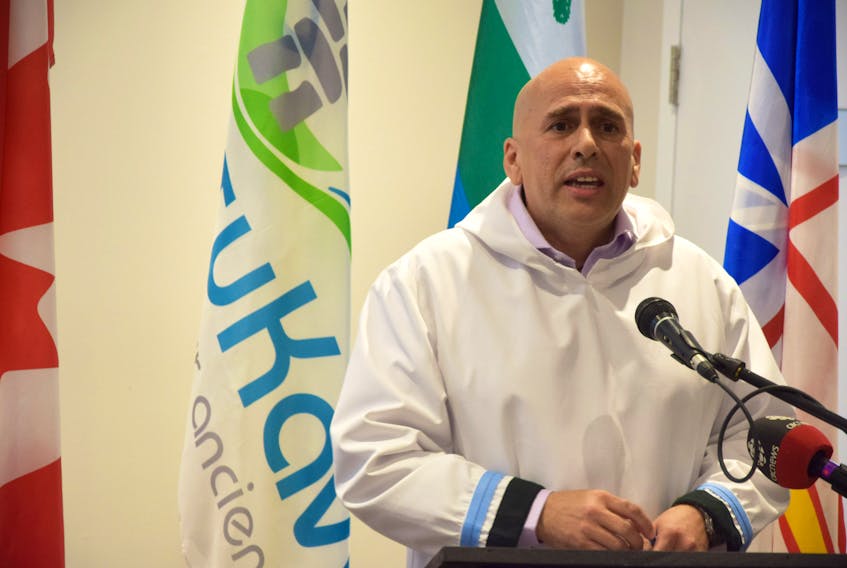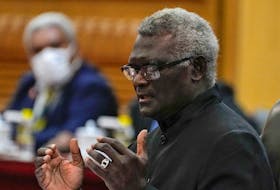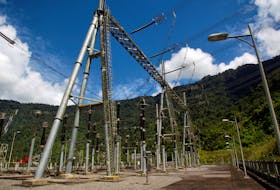HAPPY VALLEY-GOOSE BAY, N.L. — NunatuKavut Community Council president, Todd Russell, is defending his governments decision to accept money from the provincial government that was originally supposed to be spent on wetland capping in the Muskrat Falls reservoir.
NunatuKavut Community Council president, Todd Russell, is defending his governments decision to accept money from the provincial government that was originally supposed to be spent on wetland capping in the Muskrat Falls reservoir.
All three Labrador Indigenous groups; the NCC, Nunatsiavut Government, and Innu Nation, were offered $10 million dollars each after it was announced by the province it was too late to do more methylmercury mitigation at the site. The NCC and the Innu Nation have accepted the money, which is to be used for health and social programming, while the Nunatsiavut Government has not.
“What we have done is brought additional resources into our organization that we’re going to be able to utilize for the betterment of our people in our communities,” said Russell in an interview with The Labrador Voice.
Russell also said the NCC made no concessions to the provincial government or Nalcor when they agreed to take the money. He also said the money is better utilized in the hands of the NCC than the provincial government or Nalcor.
“I’m not here trying to be an apologist or advocate for this damn project,” said Russell. “I never liked this project. It’s on NunatuKavut claimed land; our rights were never taken into full account”
Russell also criticized the people who have been making comments online and elsewhere that the NCC were bought out or sold out by accepting the money.
“That’s absolutely wrong, false, a mischaracterization,” said Russell. Its people playing politics on a very, very, serious issue. There is no truth whatsoever in that statement.”
When Dwight Ball announced that wetland capping was not going to happen, he said the measure would have only reduced methylmercury production in the reservoir by two per cent. Russell said, based on the scientific data he has seen, that is an accurate number.
“There is a lot out there now from the scientific community,” said Russell.
“I can’t comment on the specifics. All I know is that (two percent) is what’s been settled on in terms of the science around this.”
“It seems to be a reasonable conclusion.”
When asked if there was a possibility of people’s health or diets being affected based on current conditions in the reservoir, Russell said that’s a hard question to answer.
“That is a difficult question. The only thing I can say is that new information and data points to the fact that there may be a negligible… there may not be any appreciable, negative, impact…upon people’s diets... and people’s way of life,” said Russell.
Back in 2016, many Labradorians protested the Muskrat Falls project over the concerns of methylmercury. Dozens even stormed the gates and shutdown work on the site, resulting in charges being laid to those protestors.
Russell believes a lot has been gained in the three years since, including a better understanding of the methylmercury issue and, most importantly, more monitoring in the effected waterways.
The Nunatsiavut government has publicly called upon the Provincial Government to halt flooding of the reservoir until more mitigation can be completed. The Innu Nation, however, has stated that they agree with the province giving the $30 to the Indigenous groups, rather than using the money on wetland capping.
All three Labrador Indigenous groups; the NCC, Nunatsiavut Government, and Innu Nation, were offered $10 million dollars each after it was announced by the province it was too late to do more methylmercury mitigation at the site. The NCC and the Innu Nation have accepted the money, which is to be used for health and social programming, while the Nunatsiavut Government has not.
“What we have done is brought additional resources into our organization that we’re going to be able to utilize for the betterment of our people in our communities,” said Russell in an interview with The Labrador Voice.
Russell also said the NCC made no concessions to the provincial government or Nalcor when they agreed to take the money. He also said the money is better utilized in the hands of the NCC than the provincial government or Nalcor.
“I’m not here trying to be an apologist or advocate for this damn project,” said Russell. “I never liked this project. It’s on NunatuKavut claimed land; our rights were never taken into full account”
Russell also criticized the people who have been making comments online and elsewhere that the NCC were bought out or sold out by accepting the money.
“That’s absolutely wrong, false, a mischaracterization,” said Russell. Its people playing politics on a very, very, serious issue. There is no truth whatsoever in that statement.”
When Dwight Ball announced that wetland capping was not going to happen, he said the measure would have only reduced methylmercury production in the reservoir by two per cent. Russell said, based on the scientific data he has seen, that is an accurate number.
“There is a lot out there now from the scientific community,” said Russell.
“I can’t comment on the specifics. All I know is that (two percent) is what’s been settled on in terms of the science around this.”
“It seems to be a reasonable conclusion.”
When asked if there was a possibility of people’s health or diets being affected based on current conditions in the reservoir, Russell said that’s a hard question to answer.
“That is a difficult question. The only thing I can say is that new information and data points to the fact that there may be a negligible… there may not be any appreciable, negative, impact…upon people’s diets... and people’s way of life,” said Russell.
Back in 2016, many Labradorians protested the Muskrat Falls project over the concerns of methylmercury. Dozens even stormed the gates and shutdown work on the site, resulting in charges being laid to those protestors.
Russell believes a lot has been gained in the three years since, including a better understanding of the methylmercury issue and, most importantly, more monitoring in the effected waterways.
The Nunatsiavut government has publicly called upon the Provincial Government to halt flooding of the reservoir until more mitigation can be completed. The Innu Nation, however, has stated that they agree with the province giving the $30 to the Indigenous groups, rather than using the money on wetland capping.
[email protected]








